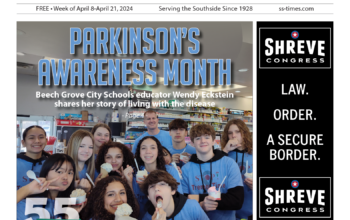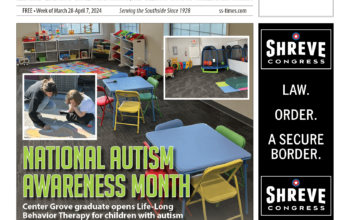By Nancy Price
Layden Vaughn is a typical 10-year-old in many ways. He enjoys all things Disney, SpongeBob cards, music, painting in class at Mary Bryan Elementary School and beatboxing.
He’s also close with his younger brother, Cooper, 9. Yet his mother, Rachelle feared that would never happen nine years ago.

Around the time Layden turned 1, Rachelle noticed that he was slightly regressing in some developmental areas. “He was no longer trying to talk or approximate new words, he was starting to avoid eye contact and his social anxiety was very high,” she recalled. “His first birthday party, he cried for the majority of it. When his younger brother was born, Layden was uninterested in him and never paid any attention to him.”
He also began to hoard toys, as opposed of playing with them, was upset if they were moved and showed no interest in interacting with children his age. Rachelle eventually brought Layden to his pediatrician, who recommended an evaluation by ProKids Indiana First Steps, a statewide early intervention system that serves children with developmental disabilities.

“(The staff) would all tell me that they believed he had Sensory Processing Disorder, but autism was never mentioned,” she said. “Then at his case conference when he turned 3, they told me they were diagnosing him with autism and referred us to Riley Hospital for Children.”
Specialists at Riley explained the importance of early intervention and ABA (applied behavior analysis) for those diagnosed with autism. Layden began meeting with a therapist at Cornerstone Autism Center in 2013 for seven hours a day, five days a week. Rachelle began to notice Layden improving developmentally within the first few weeks.

“He was trying harder to communicate with us, repeating words and sounds and his eye contact was improving right off the bat,” she said. “When he started therapy, he had maybe a handful of words that he could say. He now speaks in full sentences and continues to increase his language all the time. He can write his name and is learning how to read and spell! Also, when he started at Cornerstone, Layden had a very difficult time attending to tasks or activities longer than a minute. He now sits for long periods of time in his classroom!”
Elle Scanlan, Board Certified Behavior Analyst with Cornerstone, worked closely with Layden and noted vast improvements, including his communication, social and attention skills, compared to when he started attending therapy. “By the time he graduated Cornerstone, he was able to ask those around him questions regarding changes in his environment and daily schedules,” she said. “He also seemed to adapt to changes in routines with less distress than when he started.”

“I’d say the most impactful thing that Layden does now that I wasn’t sure he’d ever do is interact with his brother,” Rachelle added. “There were years and years where Layden wouldn’t even look at his brother, Cooper. And now he will ask his brother questions an they will have conversations back and forth! Its amazing to see their relationship now compared to where it was. Also, I will never forget the first time Layden said, ‘I love you, mom.’ I had heard other kids his age say that to their mothers and my youngest says it to me all the time. So when I finally heard it from Layden, it was an extremely emotional experience and I just wanted him to keep saying it over and over and over again. It was the best thing in the entire world.”
When Layden completed therapy at Cornerstone, the staff held a graduation party for him; he even wore a cap and gown. “Watching Layden at his graduation, you could tell that he felt very proud,” Rachelle said. “He kept smiling and looking at everyone like, ‘Wow! You are all here for me! Look what I did!’ He kept taking the microphone and singing and beat boxing in it to get a laugh. It was a proud moment for all of us.”
COVID-19 AND ADAPTING TO CHANGES IN ROUTINE
Children with autism rely heavily on a set schedule. Now that social distancing is a new norm, those on the autism spectrum disorder need to adapt to a new routine. Rachelle Vaughn offers this advice: “Create as much structure for them as you can. Also make sure you’re spending quality time with them and not just pushing schoolwork. And limiting screen time as much as you can.” Elle Scanlan, Board Certified Behavior Analyst with Cornerstone added: “Activities that stimulate the senses can be useful – weighted blankets, listening to music, playing with sensory toys and gross motor movement.”

